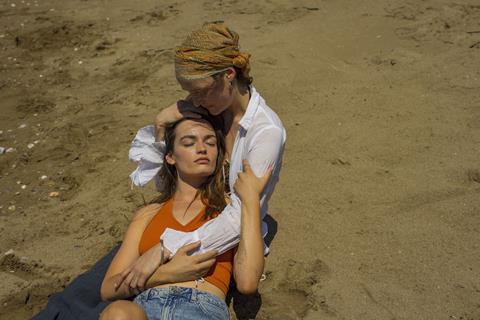’Sex Education’ star headlines Berlin Competition title with Vicky Krieps and Fiona Shaw

Dir/scr: Rebecca Lenkiewicz. UK. 2025. 93mins.
Sofia (Emma Mackey) has been caring for her intermittently wheelchair-bound mother Rose (Fiona Shaw) for as long as she can remember. Rose, whose chronic pain migrates around her body as unpredictably as her mercurial moods, leans on her silent, stewing daughter as they embark on a last-ditch treatment attempt at a private clinic in Spain. Sofia, meanwhile, escapes from their claustrophobic co-dependency by embarking on a passionate affair with the capricious and emotionally unavailable Ingrid (Vicky Krieps).
The film’s uneasy atmosphere is ramped up by the use of sound
The feature directing debut from screenwriter Rebecca Lenkiewicz, who has adapted Deborah Levy’s 2016 novel, Hot Milk lacks some of the lush, heady symbolism of the book, and opts for a less teasingly ambiguous approach to the storytelling. Mackey, however, impresses, as a woman driven to distraction by the neediness and manipulation of those around her. Mubi holds the rights for multiple territories and will likely be hoping that the film taps into a similar audience to that of Maggie Gyllenhaal’s The Lost Daughter (both films are literary adaptations, both deal with mother-daughter tensions, both share beach resort locations and uncompromisingly feel bad endings). Without the same degree of marketing-friendly star power in the cast, however, Hot Milk may struggle to match the reach of Gyllenhaal’s picture.
Adapting Levy’s books for screen has previously proved challenging, with last year’s Swimming Home (directed by Justin Anderson, who co-wrote it with Levy herself) a case in point. What seems intellectually playful on the page can feel rather laboured and inelegant on the screen. Hot Milk is uneven, but it is rather more successful as an adaptation than Swimming Home, largely thanks to Mackey’s persuasive journey from pliant, broken-spirited wraith to raging harridan brandishing knives and fish guts at local men.
Lenkiewicz, who was the first living female playwright to have her work produced on the Olivier Stage at the National Theatre in London and whose screenplays include the Oscar-winning Ida (co-written with Pawel Pawlikowski), Disobedience, Colette and She Said, demonstrates striking visual instincts – the rather down-at-heel resort where the story unfolds is viewed through a shimmering heat haze of desire; a repeated motif of reflections hints at Sofia’s long-suppressed anger finally emerging. Unexpectedly, it’s the bitty, awkwardly-placed screenplay that is more of a sticking point.
The film unfolds mainly in what we are told is Almeria, Spain (the Greek beach town of Marathon is a not entirely convincing stand in). Up in the hills above the scrub-lined seafront and the beached, paint-flaking fishing boats, is the clinic. An edifice of concrete and layers of glass (like the Doctor/therapist Gómez, played by Vincent Perez, the building reflects back what you want to see), this is a healing establishment that doesn’t come cheap. “He cares,” says Rose, confidently. Her daughter points out that the twenty-five grand fee might have something to do with it.
The relationship between mother and daughter is dominated by Rose’s whims and weaknesses. Rose sends Sofia away to work (she is half-heartedly dipping into her stalled Masters thesis on the anthropologist Margaret Mead) but then, in the next breath, burdens Sofia with requests – for water, but not just any water, it must be the right water. As Sofia starts to spread her wings and make her own choices, her mother doubles down on her stifling demands. Meanwhile, the enigmatic Ingrid blows hot and cold, clings and then pushes Sofia away. Krieps’ considerable charisma goes some way towards papering over the cracks, but the character is oddly insubstantial and is lumbered with several thuddingly clumsy and unconvincing lines.
The film’s uneasy atmosphere is ramped up by the use of sound – the incessant barking of a chained dog takes on a nerve-shredding intensity – and through Matthew Herbert’s eerie score. Fans of the book might be divided by the film’s bold ending but, while it may not be entirely faithful to the source material, there’s no denying the dramatic impact of the closing scene.
Production company: Bonnie Productions, Never/Sleep Pictures, Heretic
International sales: Hanway Films info@hanwayfilms.com
Producers: Christine Langan, Kate Glover, Giorgos Karnavas
Cinematography: Christopher Blauvelt
Production design: Andrey Ponkratov
Editing: Mark Towns
Music: Matthew Herbert
Main cast: Emma Mackey, Fiona Shaw, Vicky Krieps, Vincent Perez, Patsy Ferran, Yann Gael, Vangelis Mourikis























No comments yet